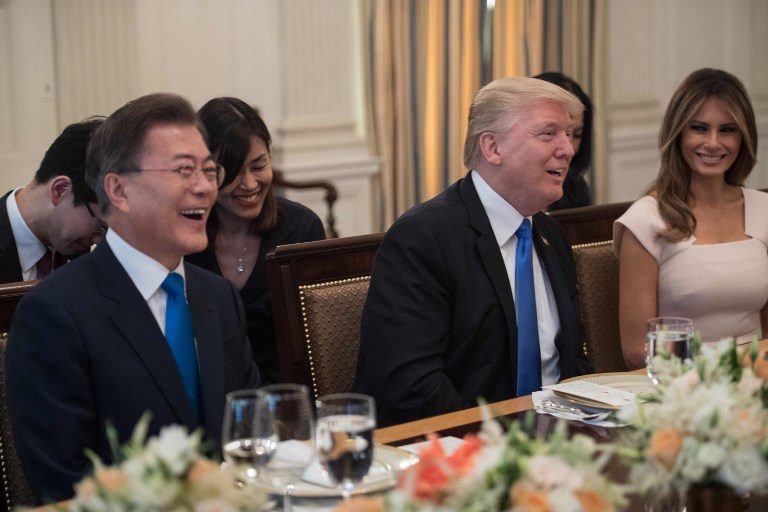SUMMARY
This is AI generated summarization, which may have errors. For context, always refer to the full article.

WASHINGTON DC, USA – US President Donald Trump and his South Korean counterpart held talks Thursday, June 29, on how to halt North Korea’s nuclear drive, but remained at odds over whether to isolate or engage the Pyongyang regime.
Trump welcomed the newly-elected South Korean President Moon Jae-In to the White House for a formal dinner that preceded the heavier lifting that was to come later in the evening during talks on what to do about their ongoing standoff with the North.
“We’re going to have tremendous discussions tonight,” Trump said at the dinner, flanked by his wife Melania and by Moon, on his right. Seated next to Moon at the elegant, flower bedecked table was his wife, First Lady Kim Jung-soon.
Members of Trump’s cabinet and Korean delegation were also seated at the elegant dinner table, which ran the length of the room.
“I know you’ve been discussing with our people some of the complexities of North Korea and trade and other things, and we’ll be discussing them all as we progress – and it could be very well late into the evening,” Trump said.
Earlier on Thursday, Moon lobbied US leaders to back his policy of engagement with North Korea, as the Trump administration vowed to increase pressure on Pyongyang over its nuclear program.
The Trump administration has been trying to isolate the North Korean regime following a series of missile tests, including by persuading China – Pyongyang’s main diplomatic ally – to help bring Kim Jong-Un into line.
But speaking on board his flight to the United States Wednesday, June 28, Moon said Seoul and Washington should offer concessions to Pyongyang if it complies with their demands, according to multiple South Korean reports.
“Without rewarding North Korea for its bad actions, South Korea and the United States should closely consult what they may give the North in return for a nuclear freeze,” he said.
“A nuclear freeze is a gate to dialogue and the exit of the dialogue is a complete nuclear dismantlement,” he added.
The visit is the first since Moon’s resounding election victory just a few weeks ago.
The day commenced Thursday with Moon being received by congressional leaders.
Moon met with House Speaker Paul Ryan and top House Democrat Nancy Pelosi in an ornate room in the US Capitol, with Ryan hailing “strong” bilateral ties but only briefly addressing security issues on the Korean peninsula before reporters were ushered out.
“We have shared concerns such as the threats posed to both of our nations from North Korea,” Ryan told Moon.
The South Korean president responded by saying that when it comes to humanitarian issues, “we must cross boundaries and all party lines and all try to unite together as one.”
Moon also met with US senators including Majority Leader Mitch McConnell, Senate Armed Services Committee chairman John McCain and Senate Foreign Relations Committee chairman Bob Corker.
Trump and Moon were to continue their talks – likely again dominated by North Korea – at the White House on Friday, June 30.
Washington, South Korea’s security guarantor, has more than 28,000 troops in the country to defend it from its communist neighbor, which has been intensifying missile tests – including 5 since Moon’s inauguration.
Pyongyang is seeking to develop nuclear-capable ballistic missiles that could reach the continental United States.
Trump has been pushing for tougher sanctions against Pyongyang to curb its nuclear ambitions and his administration has said military action was a possibility.
Washington and Seoul “share precisely the same goal, which is the complete dismantlement of North Korea’s nuclear and missile programs,” a senior US administration official said.
“That is the hard challenge that we have been wrestling with for a couple of decades now.”
Trump seeks to heap economic and diplomatic pressure on Pyongyang “in order to change their calculus,” the official said.
“Right now we see no evidence that they are seeking to reduce the threat from nuclear weapons or ballistic missile technology.”
Also expected to be high on the agenda is a controversial US missile defense system that has been installed in South Korea to guard against missile threats from the North.
Though parts of the Terminal High-Altitude Area Defense (THAAD) system are already in place, Moon suspended further deployment following a furious campaign of economic sanctions and diplomatic protests by Beijing. – Rappler.com
Add a comment
How does this make you feel?
There are no comments yet. Add your comment to start the conversation.